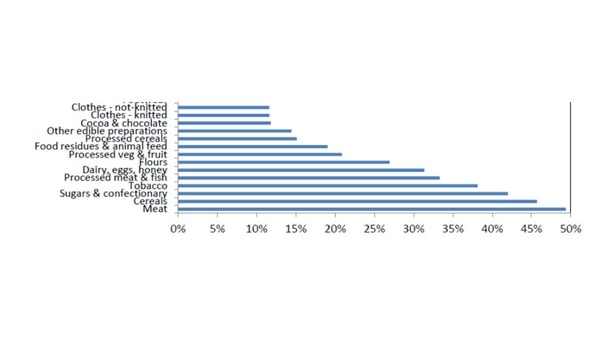For decades business students were warned of the pitfalls of the Irish economic model which was heavily dependent on exports to the UK, writes Business Editor David Murphy.

Trade with Britain as a proportion of Ireland’s exports has fallen over recent decades as companies have grown sales to other countries. But the UK is still a substantial trading partner.
Almost 14% of goods exported were destined for the UK in 2015, according to the CSO. Among the top exports were meat, medical and pharmaceutical products, chemicals and dairy.
The export of services was more dependent on Britain at 18% in 2014. Top of that list was transport, tourism, communications, insurance and financial services.
On the face it this seems manageable in the context of Britain leaving the EU. But the CSO figures include multinationals with operations in Ireland.
An entirely different picture emerges when one examines the exposure of Irish-owned companies.
Figures from Enterprise Ireland, the State body which supports indigenous exporters, show a much higher exposure to the UK market.
Its chief executive Julie Sinnamon says its research, based on 3,375 surveyed companies, shows that in 2015 firms it supports exported €20.6bn in total. Some €7.52bn or 37% of that total went to the UK.
Of the British bound exports, €1bn was beef. In a hard Brexit scenario significant tariffs could be imposed on agriculture products.
The levies would be almost 50% on meat, over 45% on cereals and more than 30% on dairy (see graph of tariffs from the World Trade Organisation.)

That is a worst case scenario. The UK’s exit is still two years away and nobody can be certain of the outcome.
A hard Brexit would occur if Britain does not follow Norway’s example of joining the European Economic Area or securing a Free Trade Agreement. Instead it would fall back on rules drawn up by the World Trade Organisation.
So far all the indications from British Prime Minister Theresa May are pointing towards a hard Brexit.
Ms Sinnamon argues Irish companies need to plan for that scenario. She says among other heavily exposed sectors are construction, timber, engineering and agri-tech. She says they are job intensive and big employers in the regions.
Enterprise Ireland is kicking off an effort to encourage companies to grow sales outside the UK.
The agency will hit the road in the coming months with trade missions to eurozone countries, the US, Canada, the Gulf States and the Asia Pacific region.
Many companies face big cultural and linguistic challenges.
Where firms don’t have the language skills to sell their products and services in new markets they will have to acquire expertise by hiring locals on the ground.
They will also have to build up contacts were they did not have them before.
It will require hard work and it may take some time to pay off.
Entrepreneurs and managers have a two-year window to plan for the worst and hope for the best.
Comment via twitter @davidmurphyRTE
